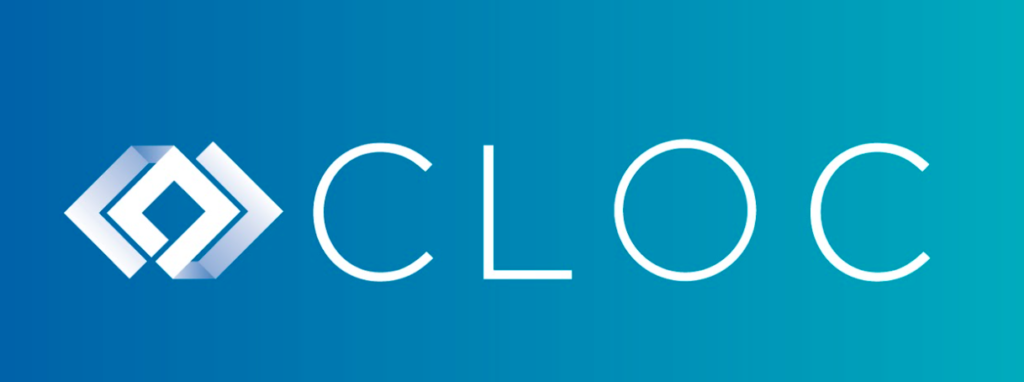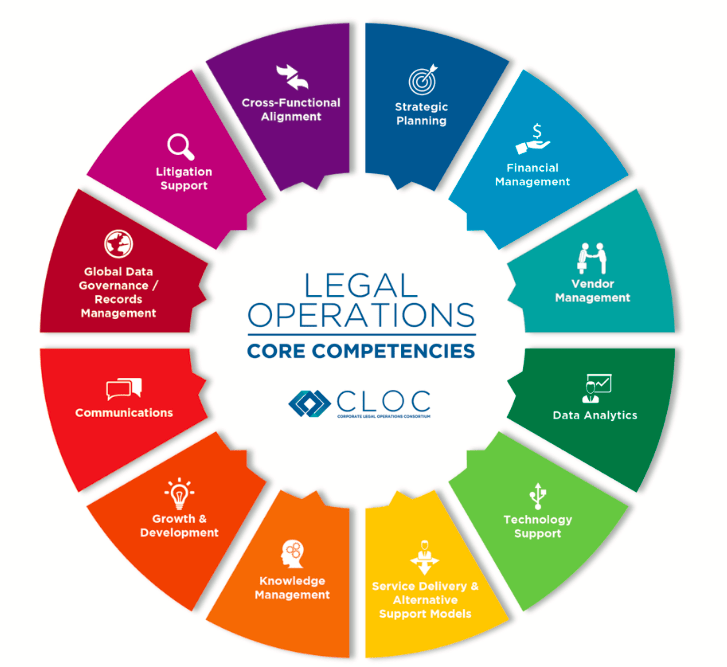
CLOC, or the Corporate Legal Operations Consortium, is only a relatively new kid on the legal sector block, but the inhouse legal operations group is having a big impact already.
Its focus on efficiency, legal process and leveraging technology, as fully outlined in its 12 core competencies (see graphic below) has not only got the attention of GCs around the world, but of many of the leading legal AI companies as well.
Artificial Lawyer recently caught up with Connie Brenton (pictured above), Sr. Director of Operations (Legal Department), at US tech company, NetApp, Inc, who is also the founder and CEO of CLOC.
–
Connie Brenton is quick to note that CLOC is something of a phenomenon in legal circles after a very short time. She notes that it has gone from 40 members to 800 members representing 500 companies in about 18 months. The companies include 25% of the Fortune 500.
In January, CLOC will hold its first EMEA Institute in London (it’s held two in the US with the third set for April 2018). Many hundreds of people, including many partners of major law firms and GCs from top companies are expected to attend. Not bad for a group that has a focus on ‘operations’, which was once seen as a less exciting area of the law by many senior corporate lawyers.

‘We are seeing a fundamental maturation of the corporate legal services industry before our eyes,’ says Brenton.
The next thing Brenton is quick to point out is that ‘AI isn’t magic, you know’. She makes this observation as if testing to see if Artificial Lawyer is one of the hype brigade, but is quickly reassured that this publication is focused on the real and the practical. Brenton seems to approve.
She also mentions that far from observing AI from afar, her employer, NetApp Inc, is using Kira Systems, the Canadian legal AI doc review pioneer. Others, she notes, are using Seal Software, Brightflag and Onna to name just a few.
Brenton is a fan of new legal tech, but she is also very pragmatic and unafraid of pointing out the challenges tech also can create.
‘In the long-run technology like AI is awesome, but in the short-term it’s time consuming,’ she says, then adds: ‘You also need to have some other types of technology in place before you can leverage AI.’
I.e. there is no point in an inhouse legal team getting excited about AI if their document management system is still archaic and running on Windows 98. Another issue Brenton points to is the challenge of having different types of legal tech that won’t talk to each other, though AI companies are addressing this with APIs.
But, grumbles aside, AI is a welcome development and will increasingly be on the minds of inhouse operations teams.
The Bigger Picture
In terms of the bigger picture, which no doubt will also impact the use of new tech such as AI, Brenton notes that the major change that she sees is more work going back to inhouse legal teams.
‘Law firms are starting to see work go away,’ she notes. ‘Bread and butter work is going away because of tech and other external providers.’

This is because since 2008 inhouse teams have ‘been expected to run like a business’ and ‘are expected to have a budget and be efficient just the same as any other department in a company’.
She adds that because GCs are now closer to CEOs and CFOs than ever before they are expected to be more business-focused and this in turn changes the view of how inhouse teams should operate. I.e. they are no longer little islands free from economic reality.
And, naturally, ‘legal ops’ is part of this change, bringing rigour and efficiency to unstructured practices.
‘Lawyers now see that they are behind on these things, now they want to catch up,’ she notes, which certainly seems true for part of the market.
She also points out that inhouse lawyers can handle even complex matters at $100 an hour, less than many US law firms would charge out for their most junior of junior lawyers. And legal ops teams are well aware of this.
The Future
Brenton sees a legal world that is ready for change, that needs to change, where so many traditions just need to come to a stop and be replaced by something more efficient.
This view stretches out across the legal world, including law schools. ‘Look at law students, they leave with huge debts, they have golden handcuffs,’ she notes and explains that this means they then have to take the best paid job they can, often where practices are inefficient and yet such young lawyers have a good reason to just accept the status quo: they have a massive debt to pay.

‘The law schools don’t want to change this, nothing changes because the professors have tenure,’ she adds.
Then there is the implicit challenge of reforming an industry that regulates itself state by state and where those regulators are senior lawyers who have benefited from the system being so inefficient.
‘The ABA and other regulators can make changes to how things are, such as addressing Alternative Business Structure issues, at least as they apply to the firms that support businesses and government entities. This needs to be addressed,’ she says firmly.
The UK has already made some needed changes in this area, allowing lawyers to partner with non-lawyers, for example, as seen with the Big Four accountants. The US is way behind and will give a competitive advantage to others soon if this is not fixed, Brenton adds.
Then there is the way that law firms are still, despite some changes, a springboard to inhouse roles, which in turn cements bad practices into the corporate legal function: that needs to change too.
‘Some inhouse lawyers feel indebted to the firms they came from, they’re all friends,’ she adds.
In short, the legal system is systemically set up to prevent radical change to the status quo. No wonder it took 2008 and the rise of legal tech to make an impact.
Brenton and her colleagues at CLOC therefore certainly have their work cut out for them. Reforming the commercial legal system will be a vast task and the adoption of AI and other tech is just one facet of change that will also have to include reforms to the profession as a whole.
But, if any group is likely to make an impact on these aims then it is CLOC. Right now they look like absolutely on the right side of history. Artificial Lawyer wishes CLOC well and hopes to see them in January in London.
1 Trackback / Pingback
Comments are closed.